Welcome
The 21st IFAC World Congress 2020 is welcoming you as part of the global automatic control community onboard the 1st Virtual IFAC World Congress spaceship.
Following the 60 years tradition in IFAC – the International Federation of Automatic Control –, every three years, starting from 1960 in Moscow, the international automatic control community meets to exchange and discuss the most recent research findings in the broad field of systems, control, and automation. With several thousand attendees from all over the world, the IFAC World Congress is the biggest and most important meeting of this kind. This year, the memorable year 2020, Germany with its capital Berlin is proudly hosting the 21st IFAC World Congress 2020 following the motto “Automatic Control – Meeting Societal Challenges”.
It could have never been expected that this motto could become alive in such drastic manner that the COVID-19 pandemic would force the World Congress to undergo a metamorphosis into the 1st Virtual IFAC World Congress, the IFAC-V 2020.
The organizers of IFAC-V 2020 accepted this special challenge and put all efforts into offering you a really exciting and lively World Congress program on the virtual and global podium of the World Wide Web.
For the organizers as well as for you as attendees, it will be an adventure, like flying in a spaceship, to explore the virtual space for making and attending the 1st Virtual IFAC World Congress.
The organizers put all efforts into maintaining all classical congress events like plenaries, a broad scope of scientific sessions, tutorials, workshops, round table discussions, and even interactive elements like demonstrators, competitions, and social events, but offering all of them in a new format, now as virtual congress elements.
Welcome by Frank Allgöwer
IFAC President 2017-2020
Welcome by Klaus Janschek
General Chair IFAC 2020
Welcome by Rolf Findeisen and Sandra Hirche
IPC Co-Chairs IFAC 2020
Welcome by Dagmar Dirzus and Dieter Westerkamp
VDI – The Association of German Engineers
VDI/VDE-GMA is the German National Member Organization of IFAC.
Welcome by Frank Allgöwer
IFAC President 2017-2020
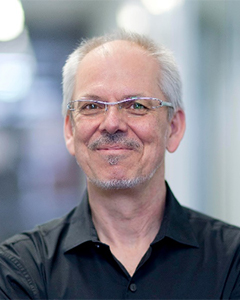
It is my great pleasure to welcome you on behalf of the International
Federation of Automatic Control (IFAC) and on behalf of the congress
organizing team to this first virtual IFAC World Congress
ever.
For IFAC, the World Congress is not merely a very big
conference on systems and control (in fact it is the biggest of its
kind), but it is the one event that all other IFAC meetings (the almost
100 IFAC conferences and the over 200 organizational meetings between
World Congresses) are aligned and oriented towards. For IFAC, the World
Congress marks the end of a triennium, the end of the term of office of
the current leadership and at the same time the start of a new triennium
with newly elected IFAC officials for the next three years.
When looking back on the last three years as IFAC president, I am not
only astounded how fast time passed, but I am also happy that we did
make a difference – lasting changes that will hopefully show their
positive and beneficial impact for the future of IFAC: From important
transformations of the executive structure of IFAC, to new initiatives
benefitting the control community at large (like the new activity fund;
the IFAC Distinguished Lecturer Program; the IFAC diversity strategy;
new awards; the IFAC Code of Conduct; a journal reviewing concept; POL
changing to diamond open access; the website archiving initiative; a new
dedicated IFAC conference app; …). I especially want to mention our
various efforts to keep the rising conference registration fees for
conferences in bounds. I think it is fair to say that we moved away from
a stable steady state, embraced change as something positive, and found
new ways, ideas and projects moving IFAC forward. I am indebted to the
more than 2000 volunteers within IFAC that made this possible in the
first place: to not only get the day-to-day work done, but also keep
questioning, changing and improving all these different aspects in IFAC
to better “serve all those concerned with the theory and application of
automatic control and systems engineering, wherever situated” (my
favourite part of the IFAC constitution).
At the same time,
of course, this also means that with the end of the Berlin World
Congress, my term of presidency ends. But what an end! I am happy and
proud what our organizing team under the Congress Coordinating Chair
Klaus Janschek has pulled together. From the great efforts already put
into the planning of an in-person meeting, to the sorrows, headaches –
and also disappointments – when it became clear that an in person
meeting is out of the question, to the harvested energy and motivation
to make this a hopefully unique, exciting and outstanding first virtual
World Congress. While probably all the World Congress organizers over
the years have had, and always will have, their ups and downs, I think
it is fair to say that we have gone through a particularly emotional
roller-coaster. From the day it became clear that a virtual congress was
the best call, we had weekly and sometimes rather daily meetings with
the whole core team; struggles, arguments, days of relieve and hope,
ambition and visions – working together towards this joint goal. I want
to cordially thank the Coordinating Chair Klaus Janschek for always
keeping a cool head and leading the team through this roller coaster,
the IPC Co-Chairs Rolf Findeisen and Sandra Hirche for their time and
efforts doing an excellent job, and each single other member of the core
team, of the working groups and also all other helping hands all over
the world. This was an immense team effort! Personally, I am
particularly indebted to Anne Koch and Julian Berberich, the two
personal assistants who supported me in a most perfect way with my many
tasks as IFAC President and with my tasks as part of the World Congress
organizing team. Thank you very much!
Now, having
thanked all the IFAC officials for such a productive triennium, having
thanked the World Congress organizing team and all helping hands for
pulling together such an incredible first virtual World Congress, I am
left to say thank you to you! Yes, you! I really want to whole heartedly
thank all participants of the World Congress, who registered, who
uploaded their final papers and videos as scheduled, who trusted us to
make this a worthwhile high-quality virtual congress and supported us by
participating. Only a negligible number of authors withdrew their
submission and a record number of almost three thousand contributions
will be presented at this World Congress.
With the dedicated
work of the organizers and all others who helped, plus the support of
the whole community, this virtual Congress stands the chance to be a
great success. And if – after this week – we agree that it was indeed a
success, then I consider the IFAC-V 2020 a success story of the
community. A success story from which we will probably learn also for
the future and from which some formats and ideas will stay for the time
beyond the Corona crisis.
Finally, let me wish us all
a very interesting and stimulating congress, inspiring talks and
presentations, watched from your office, your home or in a seminar room
together with some colleagues. Let us take the initiative and make use
of the social interaction possibilities, discussing ideas, meeting
colleagues and making new friends. Let us make the most out of the
options and formats offered. Let us make this World Congress not only a
first, but a successful first virtual World Congress.
Frank Allgöwer
President of the International Federation
of Automatic Control
Welcome by Klaus Janschek
General Chair IFAC 2020
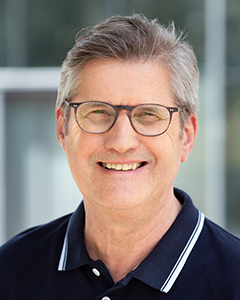
A warm welcome - “Herzlich willkommen!” - to the 21st IFAC World
Congress 2020 with the motto: Automatic Control – Meeting
Societal Challenges!
We were expecting to welcome you to
Berlin, the exciting capital city of Germany, the vibrant cross point of
innovation, science and culture. And now, as force majeure challenged
our plans, we still keep the meeting point, we just reverse the motion:
Berlin and Germany are going to you, meeting you on the global podium of
the World Wide Web at the 1st Virtual IFAC World
Congress!
The German automation and control community has
close ties with IFAC from the very beginning: IFAC was founded 1956 in
Heidelberg, the IFAC secretariat was located until 1975 in Düsseldorf,
the 50th IFAC anniversary was celebrated 2006 in Heidelberg, to date 81
IFAC events (sponsored/co-sponsored) have been held in Germany and this
year Germany is proudly hosting the 21st IFAC World Congress.
Now
the IFAC World Congress returns to Germany after 33 years, the 10th
edition was held 1987 in Munich, and it returns in a very special way,
so to speak in the double “1st“ role: as the 21st IFAC
World Congress and simultaneously as the 1st Virtual
IFAC World Congress.
Virtual congress story book
Normally one gets only
the chance once in lifetime to organize an IFAC World Congress, for the
IFAC 2020 organization team this has become true even twice at one time:
preparing one traditional in-person congress for more than six years and
preparing one congress in a completely different and new format, a
completely virtual congress to be set up within a few months. What
special experiences, what tremendous challenges!
Preparing for a
4000+ person event is already a big challenge, in particular when done
within a scientific community with mostly volunteer team members. After
more than six years the preparations converged to a “perfect” or at
least to a “best as possible” in-person congress at unique event areas
in Berlin. Numerous on-site visits with checking rooms and locations,
tasting of menus, up to riding public transportation for ensuring smooth
traffic during the congress week gave us confidence for being ready to
run a smooth in-person congress: 22.000 m2 congress area for 25 parallel
sessions, plenary lectures, demonstrations and competitions, 10.000 m2
event area and catering for congress dinner party, 1000+ hotel rooms,
technical equipment, catering … each single dish with local German foods
and beer was planned and ordered.
We could never imagine that the
IFAC 2020 motto “Meeting Societal Challenges” eventually could become
THE key driver for the 2020 IFAC World Congress. After the sudden
outbreak of the COVID-19 pandemic early this year, we still tried for
long time to keep the in-person congress planning and just to complement
it by some virtual elements for some, at that time anticipated few,
participants not allowed to travel. When it became evident that travel
restrictions and even lockdowns had been implemented globally with
uncertain timeline, and after careful trade-off of feasible work-around
solutions, we decided to switch to a completely virtual congress. This
decision was the hardest we could imagine, because it affected both your
disappointed expectations and our destroyed laborious preparations for
an in-person congress.
And yet, it is said that every crisis
offers new chances and may give birth to new ideas and solutions. In
this spirit the whole IFAC 2020 organizing team accepted this challenge
and worked hard in the last weeks to bring forward numerous new ideas
and formats for securing quality of a virtual congress and still
bringing to all of us in the best possible way the atmosphere of a real
World Congress.
IFAC-V 2020 facts and highlights
As you can see
from the IFAC-V 2020 program we have tried to keep all main elements of
a traditional World Congress and adapting them to the virtual world, for
some elements we even found some new and promising opportunities. We
gladly let Digitalization, one of our addressed societal challenges,
work for us.
Running a World Congress means first to think
globally and still act locally for convenience of the participants
distributed over five continents. The backbone for coping with spatial
distribution and time concurrency is the IFAC-V 2020 Global Live
Track, offering a total of 40 hours with live event
character. In the framework of this track that will run during the five
congress days July 13-17, all events with live character will be
featured concurrently in a daily 4-6 hour time slot. This time slot is
chosen such that it is at a (more or less) acceptable time of day in all
global time zones. Events of the Global Live Track, like the opening and
closing ceremonies of the congress, plenaries, semi-plenaries,
industrial keynotes, awards, tutorials, competitions, demonstrators and
panel discussions will offer screencasts supplemented by live
components.
The 2956 final contributions will be presented in
250+ Virtual Sessions. All presentations will be
made available for on-demand download as pre-recorded screencasts/videos
in addition to the PDFs of the papers. Interactive discussions for each
contribution by means of online forums will give you opportunities for
lively public and individual discussions.
The scientific program
is complemented by a Workshop Day on Saturday, July 11,
offering a series of workshops with a broad scope of topics.
The biggest challenge for a virtual congress for sure are the
social aspects in terms of having personal exchange,
discussions and fun with colleagues and friends. Yes this is indeed an
indispensable element of every IFAC World Congress and it is the most
difficult to build up virtually. Beside your individual usage of social
media, we have set up some social platforms, such as focused forums for
registered participants, fostering mutual scientific discussions. Please
enjoy also the first time IFAC-V 2020 cultural event: the unique
IFAC (Virtual) Control Orchestra and enjoy and actively
participate in the very special IFAC-V 2020 surprise social
events.
Acknowledgement
Whoever has prepared an IFAC event
knows best about the organizational challenges for managing and building
a congress on primarily voluntarily basis. This is now the right place
to pay tribute to the big team and supporters who made IFAC-V 2020
possible and eventually to launch it successfully to virtual space. My
first thank goes to Frank Allgöwer, who actually is the father of this
World Congress, he successfully lead the German application jointly with
Dieter Westerkamp (VDI) when being selected by the IFAC Council for
hosting the 2020 World Congress, and Frank continuously contributed with
innovative ideas and actively participated in the congress preparations,
far beyond his responsibilities as IFAC president.Big thanks and
appreciation go to the IPC – International Program Committee IPC – with
the outstanding Co-Chairs Rolf Findeisen and Sandra Hirche. They set up
a terrific scientific program, thanks to all the IFAC Technical
Committees and thousands of colleagues worldwide performing the
incredible number of more than 13300 paper reviews. As you
experience it today, the congress wouldn’t look like this without the
significant personal efforts and commitments of the NOC – National
Organizing Committee – and here to mention in particular the Core Team
and the Virtual Congress Taskforce, chaired by the “Virtual Mastermind”
Rolf Findeisen. He succeeded in implementing such a big virtual event
without any blueprint in only 10 weeks … incredible great job done!
Honest appreciation is given to the German IFAC National Member
Organization, the VDI – Verein Deutscher Ingenieure for taking the
financial patronage, a big thanks is given to our industrial sponsors
and institutional supporters, thanks to the IFAC Foundation for
supporting young authors from developing countries, thanks also for the
fruitful cooperation with the IFAC secretariat and last but not least to
all of you for participating in IFAC-V 2020 and making it a lively and
eventually a real and memorable event!
Epilogue
Let me finish with some personal thoughts
addressing particularly the many young researchers joining IFAC-V 2020.
I remember well my excitement when presenting a paper as young aerospace
engineer from industry at the 1987 IFAC World Congress in Munich.
Joining the presentations and following the discussions gave me a big
push for continuing research and intellectual exchange on international
level. Now 33 years later, when the IFAC World Congress returns to
Germany, gives me the never expected opportunity by contributing as
General Chair together with the IFAC-V 2020 organization team offering
you the same excitement and pushing you to go forward curious on
science, open minded on diversity and respectful on our all global
societal challenges … the floor is yours!
Klaus Janschek
General Chair
IFAC-V 2020 World
Congress
Welcome by Rolf Findeisen and Sandra Hirche
IPC Co-Chairs IFAC 2020
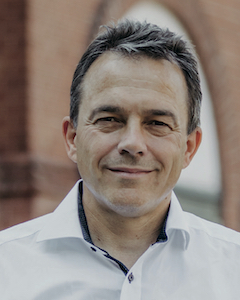
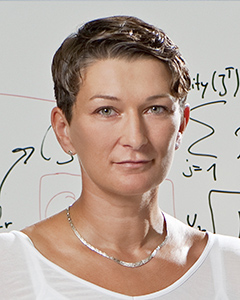
It is our great pleasure to welcome you to the first ever virtual IFAC World Congress. We started out on our congress journey more than six years ago with the vision of organizing a vibrant and innovative 21st IFAC World Congress in Berlin. On top of the chance to enjoy a wide variety of scientific contributions, attending the event would also have been a great opportunity to explore and experience the many colors and facets of the German capital.
Virtualizing IFAC 2020
Influenced by the impacts
of COVID-19, our journey ultimately became quite an adventure, charting
completely unknown territory. The organizing team put in tremendous
effort to reshape and virtualize the congress in less than three months.
The entire program – carefully planned and outlined over the past six
years by the international program committee and local program committee
– had to be turned on its head. Tasks that would otherwise have been the
responsibility of a large group of people ended up being handled by a
small handful in the run-up to the congress. Completely new challenges
emerged – how to handle and collect more than 3,000 videos of all the
congress contributions? And is it even technically feasible to have 30
parallel (sometimes live) sessions?
Success built on a strong team
Organizing all of this would
have been impossible without the tireless help of our core team. Our
special thanks for their unwavering commitment during the final and most
intensive preparation phase go to Eric Bullinger, Martin Mönnigmann,
Sergio Lucia, Thomas Schauer, their respective teams, and our Congress
Manager Silke Nienhausen. The congress in its current form would have
been unthinkable without their continuing support. As part of a
coordinated large-scale effort, they handled the checking of the PDFs,
organized a review of the videos, and established all the required
technical mechanisms. Lars Grüne did an excellent job in organizing the
twelve workshops, Carsten Scherer took care of the five tutorial
sessions, and Sebastian Trimpe brought all the challenging competitions
together. Initially planned for a live session, demonstrations were put
into virtual cyberspace by Steffi Knorn and Knut Graichen. Meanwhile,
Christian Ebenbauer handled the seemingly endless number of invited
sessions.
The congress in numbers
With 4,235 paper submissions, 93
submitted proposals for open invited tracks, 77 for invited sessions and
34 pre-conference workshops, IFAC-V 2020 is the largest IFAC World
Congress ever. We are delighted that we were able to count on a highly
committed community to review the contributions, despite the very
limited time we gave them. The 39 technical committee chairs and over
340 associate editors also did a tremendous job completing their work on
time. More than 32,290 review requests were sent out. Ultimately, 23,318
review requests were accepted, while a total of 13,355 reviews have been
received to date. Despite the COVID-19 pandemic striking during a
crucial period of publication decisions, a record number of 2,954 papers
and extended abstracts have been submitted to form the core of the final
technical program.
A virtual world congress – how will it work?
The new
congress experience is the result of an endless stream of discussions.
It is based on a collection of more than 2,900 videos/screencasts for
most contributions, accompanied by PDFs of presentation slides and
papers spanning more than 370GB of final data. Most contributions are
being presented in the so-called virtual track, which is organized
into 263 virtual sessions, including 50 invited sessions, 67 open
invited sessions, and 2 late-breaking results sessions. Nearly all
contributions can be enjoyed as videos available for streaming at any
time. For the first time in the history of the IFAC World Congress, you
will not have to decide which session to attend – indeed you could even
watch them ALL, if you can spare the time to watch non-stop for 35 days
that is! We hope that the forums provided for each contribution will
facilitate highly productive scientific discussions. The virtual event
is complemented by a global live track, which will be streamed in “real
time”. It opens with a workshop day on Saturday and continues
Monday through Friday with fantastic plenaries, tutorials, panel
discussions, keynotes, as well as exciting and inspiring
competitions.
We hope you enjoy the IFAC-V 2020 World Congress – an IFAC congress like no other!
Sandra Hirche, Rolf Findeisen
IPC Co-Chairs
IFAC 2020
IFAC-V 2020 World Congress
Welcome by Dagmar Dirzus and Dieter Westerkamp
VDI – The Association of German Engineers
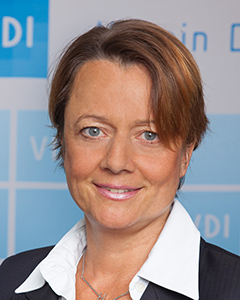
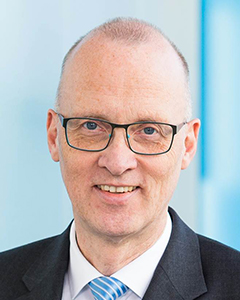
Dear friends, dear members of the IFAC community:
It is a pleasure to welcome you all on behalf of the German NMO, the VDI/VDE Society for Measurement and Automatic Control. We are proud – after about 70 IFAC conferences in Germany since 1960 – to be the host of the 21st IFAC World Congress. In 2013, we applied to organize the Congress in 2020 themed “Meeting Societal Challenges”. At that time, we definitely had no idea that this motto would fit to the current situation worldwide in such a manner.
Due to the Corona pandemic, we will host the IFAC World Congress in digital space. This is the first IFAC World Congress in the field of control and automation technology being held virtually – we feel a bit like pioneers again. It was in the year 1956, when the predecessor organization of the German NMO and the Association of Engineers in Germany VDI organized the first worldwide control conference “Regelungstechnik” in Heidelberg. This event played an important role in the foundation and history of IFAC.
About the experience of the World Congress in digital space we are very excited. How intense will the learnings and discussions be? How will participants find their way through the broad program? How will participation be per topic or per daytime? And above all: Which of the digital formats will also play a role in future IFAC conferences? Or will we even meet regularly worldwide in a digital IFAC room in the future? In any case, this 21st IFAC World Congress will be different from all previous ones – and we will learn a lot from it. We like to thank all committee members, authors and participants for preparing a memorable event.
On the other hand we are sorry that you cannot experience Berlin personally. We would very much like to introduce you to the prospering city of Berlin and its great cultural life, as well as to the famous “Berlin air”. Please do not forget to visit Berlin later to see a city state of the art with numerous highlights. Berlin is worth it!
And now we wish everyone a successful first digital IFAC World Congress – the first digital world championships in the science of control and automation.
Dagmar Dirzus
VDI/VDE Society for Measurement and
Automatic Control
Dieter Westerkamp
VDI Technology and Society





